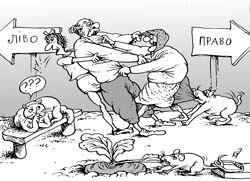A battle in 2007 before the electoral political storm in 2008?

Two events — an important one and a sad one — are expected to occur in Ukraine this fall: early elections to the Verkhovna Rada and the 90th anniversary of the Great October Socialist Revolution. In fact, there was very little greatness in the latter. Word War I and the ensuing upheavals resulted in the collapse of the Russian Empire as well as Germany and Austria-Hungary. What brought the warring countries into dire straits was impossibility to physically destroy the enemy, on the one hand, and unwillingness to settle the conflict by way of negotiations, on the other.
Ninety years on, the two main political camps of Ukraine are also waging a war of mutual destruction. They are playing a long politico-administrative chess game, in which rules are constantly changing. Eventually, one of the parties can be checkmated, although both players have slim chances for a final and irreversible victory. Neither of them will ever manage to win over the influential forces of the US, the European Union or Russia. Addressing a recent summit in Yalta, Polish ex-president Aleksander Kwasniewski said in no uncertain terms: it is up to you to solve your problems — why not strike a deal? US former president Bill Clinton, who solemnly seated himself in the legendary chair of Franklin D. Roosevelt, also said that the US would not intervene.
Unfortunately, Ukraine’s powers-that-be won’t heed the advice of foreign guests. The current generation of Ukrainian politicians was raised on the ideas of Darwinism: the fittest will survive and the rest will die. Those who died were the weakest. Like dinosaurs, they perhaps failed to adapt to the suddenly changed habitat. In our case, President Viktor Yushchenko of Ukraine, is trying to update the rules of the political game by suggesting a nationwide referendum on constitutional reform. Yushchenko thus wants to regain the powers that Kuchma had, appealing at the same time to public opinion. The president wants to win the next presidential elections by enlisting popular support. On its part, the Cabinet of Ministers is altering the economic aspects of life in this country. It keeps privatizing more and more facilities via the State Property Fund and is introducing a step-by- step increase of minimal wages and pensions. The populist-style utilization of budget revenues is the chief pre-election “bait” of the Yanukovych government.
Meanwhile, second-rate party figures continue their bitter clashes on television screen.
The trench warfare, with pressure on the Constitutional Court and the Prosecutor-General’s Office, is of no success. It only results in the depletion of moral and material resources, the tumbling popularity ratings, and voters’ disappointment with politics in general and politicians in particular. To overwhelm the enemy’s defenses, one needs an informational analogue of the Brusilov breakthrough - when tons of compromising mud is poured on the head of a stunned enemy in a matter of minutes. Then the mighty columns of political infantry - propagandists and hired street protesters - mount an attack. Then the attackers rush into the enemy’s rear and cut off the supply lines, i.e., money from election sponsors. For the best way to win an election is to financially bleed the opponent. Besides, the coming elections are certain to show such a technique as demonization of the opponent. The very term “demonization” became widely known in Russia at the end of Boris Yeltsin’s second term in office. There was also an unsuccessful attempt to demonize the oligarch Boris Berezovsky by publishing his photos taken from a sinister angle - with fiery eyes, a shining bald scalp, etc. As a result, the Russian grassroots began to see Berezovsky as the devil incarnate who is to blame for all the woes and sorrows of the Yeltsin era. In the case of Ukraine, both Yanukovych and Azarov may well be subjected to demonization. For the devil must have prompted Azarov to allege that childbirth cash benefits will be canceled. This immediately touched off a wave of popular indignation, and Azarov had to give up. Still, this left the masses disgruntled: the vice-premier could not have taken such a critical step as canceling benefits without first consulting his boss.
The Institute of Political Studies drew up last February a conflict-related model of the 2007 early parliamentary elections. This models presumes that during the election campaign one of the sides will see an attempt (feigned, in all probability) on the life of its leader, a prominent political figure. This informational trick will surely trigger a series of administrative and legal battles. This will also involve the tax authorities, transport police, and customs service. The aim is to deal the enemy’s sponsors a powerful enough, even though not fatal, blow to make them pull out of the game. This will be immeasurably more serious than the fruitless search for explosives in Yurii Lutsenko’s apartment. Those who will shoulder the brunt of the blow are not the politicians as such but the profit- making businesses whose owners morally and materially sympathize with the political rivals.
No serious political experts doubt that the current clashes between the Orange and the White-Blues are just a prelude to a great political battle. But very few of the former venture to forecast the end of this. Let me take the risk of suggesting that the winner be the political force that will manage to guarantee safety to business and win the hearts of hired labor in the new conditions. If a force like this does not emerge, Ukraine may face quite unpleasant social and financial consequences, as well as a new snap election saga followed by an economic disaster.
Volodymyr Bondarenko is chairman of the board of directors of the Taras Shevchenko Institute of Political and Sociological Studies






